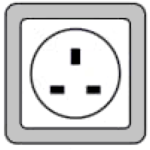Plug For Botswana: What You Need To Know
What is the plug for Botswana? Before you travel, check the information below to make sure your electronic devices are compatible with the outlet type and voltage.
Electrical Summary
Botswana uses outlet types D, G, M at a voltage of 230V and a frequency of 50 Hz.
Plug Compatibility: Type D, Type G, Type M
Voltage: 230V
Frequency: 50 Hz
Type D

Type G

Type M

Can North Americans use Electronics in Botswana without an Adapter?
No! North Americans will need an adapter for the outlets and a transformer for the voltage when traveling to Botswana. North Americans device plugs will not work with the outlet types in Botswana. Also, the voltage in Botswana is different from North American voltages.
Can Europeans use Electronics in Botswana without an adapter?
No! Most Europeans will need a travel adapter when traveling to Botswana. Most device plugs will not work with the outlet types in Botswana. However, the voltage in Botswana is the same as in Europe.
What Outlet does Botswana Use?
Type D

Type G

Type D plug sockets have two round pins and a grounding pin. These plugs are typically used with devices that have a voltage of 230V.
Type G plug sockets have two rectangular pins and a grounding pin. These plugs are typically used with devices that have a voltage of 230V.
Type M

Type M plug sockets have three round pins, similar to type D plug sockets. These plugs are typically used with devices that have a voltage of 230V.
Is it safe to drink water in Botswana?
To be on the safe side, you can use common precautions such as boiling tap water for at least one minute, using water purification tablets, or drinking bottled water. It’s also important to note that ice may be made from tap water and that foods may be washed or prepared with tap water.
We recommend always packing a filtered water bottle when traveling:
Travel Essentials
Be sure to check our list of travel essentials before your trip!
Should I get travel insurance when traveling to Botswana?
It is generally recommended to get travel insurance when traveling to a different country. Travel insurance can provide financial protection and peace of mind in case of unexpected events, such as medical emergencies, trip cancellations, lost or stolen baggage, or other travel-related mishaps.
Travel insurance can cover various expenses related to your trip, such as medical expenses, emergency medical transportation, trip cancellation or interruption, lost or stolen baggage or personal belongings, and other travel-related expenses.
Before purchasing travel insurance, it’s important to carefully review the policy details, including the coverage limits, exclusions, and any applicable deductibles or copays. You should also make sure that the policy covers any activities or destinations that you plan to participate in or visit during your trip.
Travel Summary
In addition to wildlife, Botswana also offers cultural experiences, with a number of traditional villages and communities throughout the country. Visitors can learn about the country’s rich history and traditions, including the San people’s traditional way of life.
Botswana has a good tourism infrastructure, with many lodges, camps, and resorts available throughout the country. The capital city, Gaborone, has several hotels and restaurants, and the town of Maun serves as a gateway to the Okavango Delta.
Visitors to Botswana should be prepared for a hot and dry climate, with temperatures often exceeding 40°C (104°F) during the summer months. The best time to visit for wildlife viewing is during the dry season from May to October when the animals gather around water sources. However, the rainy season from November to April can also be a beautiful time to visit, with lush green landscapes and baby animals born during this time.
Travelers should also be aware of safety concerns in some areas of the country, particularly in the northern regions bordering Namibia and Zimbabwe. It is recommended to travel with a reputable tour operator and to check for any travel advisories before planning a trip.
Traveling to another country? Check out our Countries page for more info.